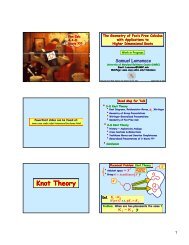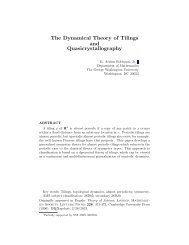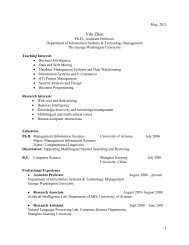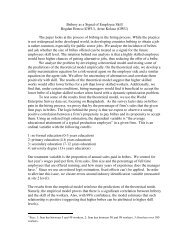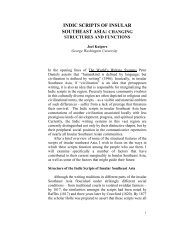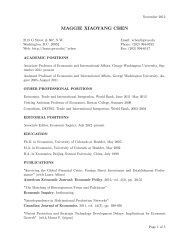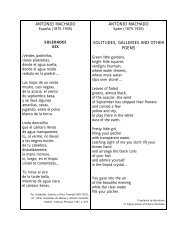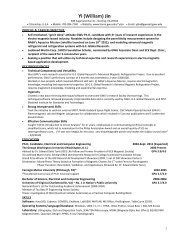Syllabus - gwu.edu - George Washington University
Syllabus - gwu.edu - George Washington University
Syllabus - gwu.edu - George Washington University
Create successful ePaper yourself
Turn your PDF publications into a flip-book with our unique Google optimized e-Paper software.
Prof. Downes IAFF 3180.80/PSC 2990.80 <strong>Syllabus</strong> Fall 2012<br />
COURSE REQUIREMENTS AND GRADE COMPUTATION<br />
The course is organized into two meetings of one hour and fifteen minutes per week. Grades will be based on the<br />
following criteria.<br />
� Class Attendance and Participation (20%): Students are expected to attend every class session, do all of<br />
the required reading before class, and come prepared to discuss it. The instructor will not lecture for the<br />
entire period. Questions are provided below for each session that will form the basis for discussion. You<br />
will be called on by the instructor at some point during the semester, so do keep up with the reading.<br />
� Midterm Examination (15%): Thursday, October 4. In-class, closed-book short-answer exam covering<br />
the first two sections of the course.<br />
� Final Examination (20%): Tuesday, December 18, 12.40 – 2.40PM. Cumulative, closed-book final exam,<br />
consisting of short answers and essays, emphasizing the last two sections of the course.<br />
� Research Paper (45%): due Friday, December 7, by 5.00PM in HARD COPY at instructor’s office, circa<br />
20 pages. See below for more details.<br />
Final grades will be calculated according to the percentages above, and will be assigned as follows: A (93-100), A-<br />
(90-92), B+ (87-89), B (83-86), B- (80-82), C+ (77-79), C (73-76), C- (70-72), D+ (67-69), D (63-66), D- (60-62),<br />
and F (0-59). Grades for this course will not be curved.<br />
BOOKS<br />
The following books are required reading and are available for purchase at The <strong>George</strong> <strong>Washington</strong> <strong>University</strong><br />
Bookstore.<br />
Stathis N. Kalyvas, The Logic of Violence in Civil War (Cambridge: Cambridge <strong>University</strong> Press, 2006).<br />
Jeremy Weinstein, Inside Rebellion: The Politics of Insurgent Violence (Cambridge: Cambridge <strong>University</strong> Press,<br />
2007).<br />
ARTICLES AND BOOK CHAPTERS<br />
All of the journal articles listed in the required reading below—unless otherwise indicated—are available online in<br />
databases accessible through the <strong>George</strong> <strong>Washington</strong> <strong>University</strong> Library. From the library website<br />
(http://www.library.<strong>gwu</strong>.<strong>edu</strong>/), click the “Journals” tab, search for the desired title, and navigate to the correct<br />
volume and issue. If you are accessing the library website from off campus, you will need to enter your last name<br />
and your GWID to obtain access. For several class sessions I have assigned book chapters in addition to journal<br />
articles. These are placed on E-Reserve, and are indicated by the term “e-res” in parentheses after the citation. These<br />
texts are easily obtained through the Blackboard site that has been established for the class. Click on “Blackboard”<br />
from the “My GW” page (http://my.<strong>gwu</strong>.<strong>edu</strong>), log in, go to the page for this class, and click on “E-Reserves.”<br />
RESEARCH PAPER<br />
In consultation with the instructor, students will select a civil war about which they will write a research paper. The<br />
goal of the paper will not be to “explain” the entire conflict from start to finish. Rather, following the outline of the<br />
syllabus, students will write about the causes, conduct, or termination of their chosen conflict. From within these<br />
broad categories, students will choose (in consultation with the instructor) a specific question (or, in rare cases,<br />
questions) to answer about the war, such as:<br />
� Which factor or combination of factors best explains why civil war occurred?<br />
� What patterns of violence characterized the conflict, and what explains them?<br />
� Was violence/terrorism effective?<br />
2



